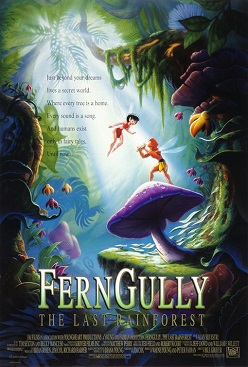 Image by CityTalk via Flickr
Image by CityTalk via FlickrNominations: Best Picture, Best Actress
The Blind Side is one of those films that people just can't help but rave about. It's the touching true-life story of Michael Oher's rise from the projects to the NFL thanks to the loving efforts of his adopted wealthy white Christian family, and everyone you talk to either loved it, really liked it, or is dying to see it.
There's no real reason why this shouldn't be the case. The film is expertly written, well-crafted, flows effortlessly, and pulls all of the predetermined heart strings in the proper order. And while no movie based on actual events is ever one hundred percent accurate, there don't appear to be any overly judicious edits or white-washing of the story like A Beautiful Mind; elements and details have been tweaked for dramatic (or comic) effect, but no one is coming out to challenge the story or its merits. This is just your average true-life Horatio Alger Rags-to-Riches story, delivering the heart-warming message that anyone is capable of achieving their dreams.
So why does it leave a bad taste in my mouth?
There's nothing bogus or unbelievable about the story; the Tuohy family did indeed take Oher in as one of their own (presumably because people with hard to read last names need to stick together), looking beyond the barriers of race. The fact alone that this actually happened should make me feel all warm and fuzzy about how far we've come in this country as far as race relations go. But after awhile, it feels like the whole racial element of the story has been sort of glossed over or, excuse the pun, white-washed. (On second thought, don't excuse that pun. I don't need your sympathy).
I know, I know; the Tuohy's overlooked race, why can't I? But no matter how much I try, it still nags at me. While the film does take a couple of brief trips to the projects where Michael came from to provide a little contrast, the rest of time is spent following a specific pattern. Racial prejudices or tensions are brought up briefly in solitary conditions, laughed off or comedic effect, then quickly stowed away again so we can get back to main task of watching this big lovable oaf blunder around winning our hearts while Sandra Bullock barges into every scene doing her best Erin Brockavich impression. The latter isn't surprising considering Julia Roberts was originally approached for the roll, but it also isn't what I would call a breathtaking Oscar-worthy performance.
This approach towards racial differences isn't just casual, it feels almost dismissive. Yes, it is brought up, but always in single moments with solitary characters seeming almost out of place in their reactions. Take the scene at Michael first football game. Are we really supposed to accept that not only is there just one racist spectator at a southern private school sporting event, but that the best insult he can come up with is "Black Bear"? I'm not suggesting that outraged bigots should have rushed the field for an impromptu lynching (is there any other kind?), but one extreme seems just as unlikely as the other. And don't forget the Tuohy's private conversation at the beginning of the scene, "Have you ever seen so many rednecks in one place?" This decidedly self-conscious attempt to separate this charitable and colorblind family from the rest of society is the film's way of almost admitting how unrealistic this race-free zone eventually becomes.
Maybe it would have been easier to take if the filmmakers had just pretended there was no such thing as racism. Then it would have been easy to become immersed in the multitude of heart-warming scenes involving this loving family taking this young disadvantaged child under the wings and showing him how to fly. But it just can't help but set up little laugh-at-racism tension breakers every ten or fifteen minutes, whether its a drunk uncle calling to ask if they know there's a "colored boy" on their Christmas cards, or Leigh Tuohy shaming her "unenlightened" sister for asking if she's nervous about Michael being accessible to her teenage daughter. If racial equality is such a non-issue, why keep bringing it up for comic relief?
But does the film really need to delve into such murky waters when all it is trying to do is entertain and inspire? Well, no. But then again, race is why this became such a popular story in the first place. Plenty of black football players have escaped the ghetto, and there are plenty of upper-class white families with sons in the NFL. The novelty of a rich white family adopting a black teenager and lending him the family structure he needed to excel far enough in his studies to even be eligible for a football scholarship, is what makes it a story worth making a major motion picture about. You can't tell a story that is a testament to overcoming prejudice while being almost completely dismissive about the reasons why it is a testament and not the norm. It would be like making a film about teenage pregnancy that avoids the subject of sex; well-intentioned, but missing the point.
Of course, raising questions like these threatens to land you smack in the middle of a classic Catch-22 scenario. One group of people complains that the film is yet another racist example of rich white people thinking that they are the only ones who can solve the problems of lower-income minorities. Another group responds by claiming these reverse-racist accusations are what white people get for actually doing something right for a change. Then another group describes the film as an elitist-liberal-democrat wet-dream, which prompts another group to identify it as a one-in-a-million story used as a shield to hide the white guilt of rich pseudo-conservatives. Everyone's either being too sensitive or not sensitive enough. If you think I'm exaggerating all of this, just do some Google searches and see what pops up.
So maybe that's why the simplicity of The Blind Side's story leaves me feeling a little uneasy. Because if the reactions from all of these groups (none of whom I think I want to personally identify with) are any indication, the racial implications and ramifications aren't as simple and easy to overlook as the film might want you to think, no matter how true-to-life its true-life-fairy-tale origins may be. And while simplistic might be the perfect recipe for a well-received feel-good hit of the year, it isn't exactly what I would call a top priority for a Best Picture nomination.
![Reblog this post [with Zemanta]](http://img.zemanta.com/reblog_e.png?x-id=8c984d29-b15e-476c-a537-14aa7efaeeed)

![Reblog this post [with Zemanta]](http://img.zemanta.com/reblog_e.png?x-id=8ab77866-5fff-43c4-a68f-c61608e67a01)


![Reblog this post [with Zemanta]](http://img.zemanta.com/reblog_e.png?x-id=ddfa59d9-a2cc-46b7-8c3d-e15ec88db49b)

![Reblog this post [with Zemanta]](http://img.zemanta.com/reblog_e.png?x-id=f14c846e-eaeb-4971-a3ec-85056f278fe2)

![Reblog this post [with Zemanta]](http://img.zemanta.com/reblog_e.png?x-id=b782d727-e5cb-47db-a937-18ea3d95317c)
![Reblog this post [with Zemanta]](http://img.zemanta.com/reblog_e.png?x-id=a870b6f7-5e70-44ea-a4e8-66231a4b4df0)

![Reblog this post [with Zemanta]](http://img.zemanta.com/reblog_e.png?x-id=494f80a5-998c-429f-84f9-e907669a6b90)
![Reblog this post [with Zemanta]](http://img.zemanta.com/reblog_e.png?x-id=fc3aae74-bd8f-4b4b-a0df-c8abb7780f8f)
![Reblog this post [with Zemanta]](http://img.zemanta.com/reblog_e.png?x-id=d85cd697-2da9-48af-80e3-065326a0267f)











![Reblog this post [with Zemanta]](http://img.zemanta.com/reblog_e.png?x-id=fe1908f2-686b-4585-8d9a-aa19a0f2ec86)